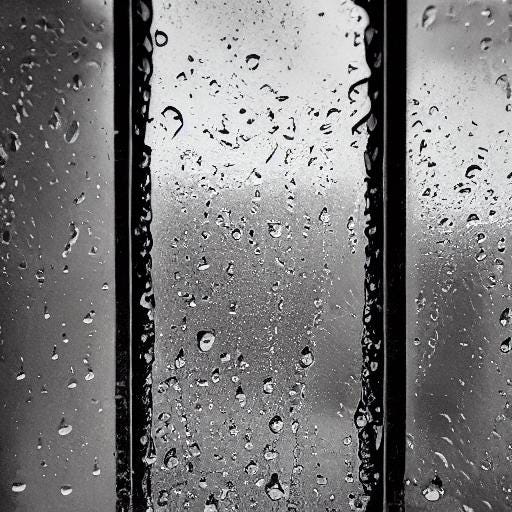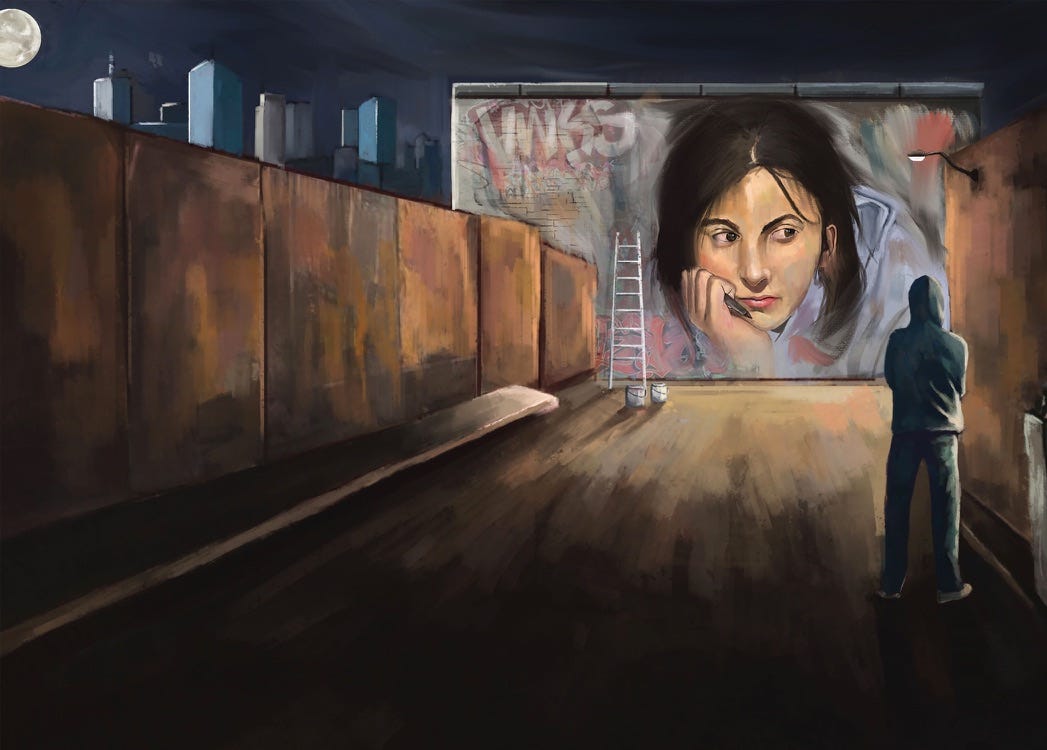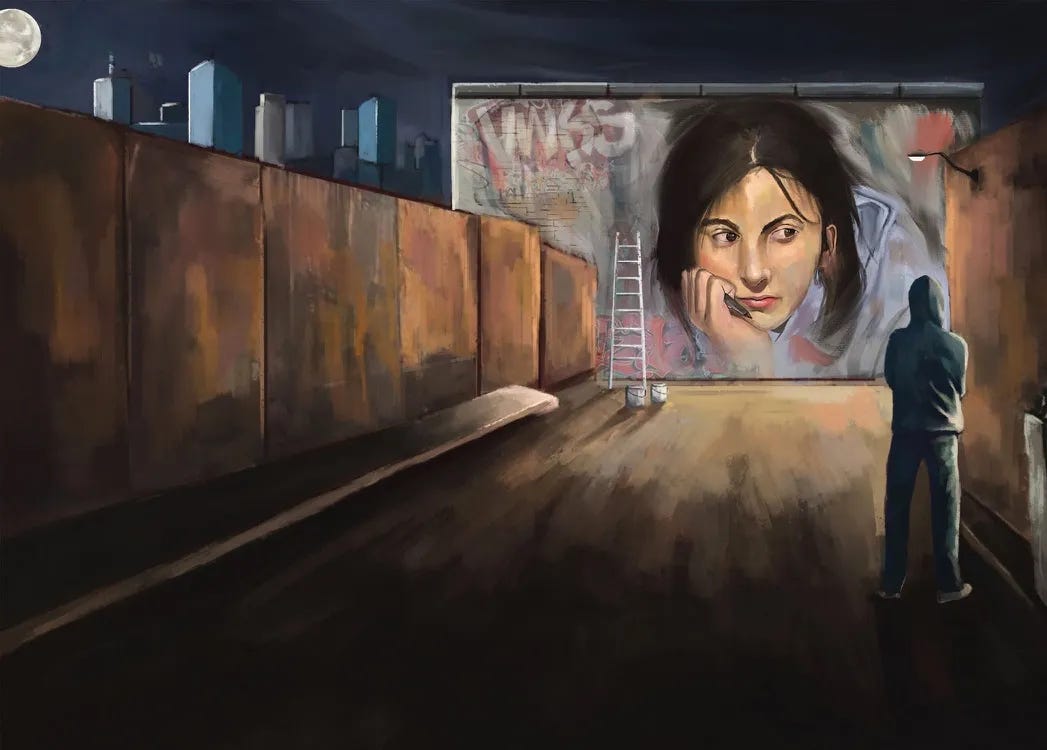Outside a winter storm flings rain against the double-glazed sliding door. Max stands, hands in dressing-gown pockets, watching the overflow from the gutters and the swaying branches above his writing den at the other end of the garden. Grandpa’s Shed, Harriet calls it, though the room, with its slow combustion stove, couch and book-lined walls, could hardly be called a shed. He’ll hurry out there in the rain after Harriet’s gone to school, and write for a while. Then, with the fire on and the storm still raging outside, he’ll lose himself in his reading and reflections and feel himself blessed to be living the life he leads. It is a cocooned life, and it feels especially so this morning watching the wild weather outside. It might be a fantasy, this feeling of being cocooned, but he feels it viscerally nonetheless, this morning, and often.
His reverie is interrupted by a single rattle in the pipes. Harriet is out of the shower and will soon be wanting her breakfast. But, for the moment, Max remains at the window.
It’s eleven years now, since the car accident that killed his daughter and left him sole guardian of Harriet, then just four years old. Max responded immediately to Harriet’s early complete dependence on him. He developed a love of cooking, of organising workable and reassuring household routines, of creating in each of the rooms in the house – and especially in Harriet’s room – a sense of calm and beauty and order. He and Harriet grew to share a love of stories and books, of conversation (even when Harriet was just beginning school), of just hanging together around the house or at the markets on a Saturday or on a drive out into the country. She had few friends (did other children find her eloquence and maturity in some ways intimidating?), and she seemed happiest – or so Max liked to think – when it was just the two of them.
But Harriet is changing and Max has not found the past months easy. Harriet is becoming more private. More moody. He should welcome her growing independence, and he tries. But it hasn’t been easy.
‘Morning Grandpa.’ Max gives a little start. Harriet has walked up behind him and has put a hand on his shoulder.
‘Morning gorgeous,’ he says.
‘Grandpa?’
‘My dear.’
‘I was looking at some books last night, here at the bookshelf,’ she says, ‘and I saw this.’
Harriet has taken a couple of books from the shelf, put them on the floor, and is now opening and closing a small door set into the wall, a door that has not seen the light of day for years.
‘It’s a milk hatch,’ Max says. ‘That’s why there’s a door on the other side of the cavity, opening up to the outside.’
‘A milk hatch?’
‘Yes, up until – oh, I don’t know – up until the late 60s the milkman used to deliver milk here. In the early morning. He’d come along with his horse and cart …’
‘In the 60s! A horse and cart?’
‘Yes, right up until the 60s, even later, they used to deliver milk from a horse and cart. Your grandmother would leave an empty container and some money in the milk hatch, and in the early morning the milko would jog up the driveway with his silver milk can, open up the hatch from the outside, and ladle out the required amount. We’d have fresh creamy milk when we woke up in the morning.’
‘Cool!’ says Harriet. Max is pleased to see her smile. ‘Life would have been so cool back then,’ she says.
Was it so cool, Max wonders. It was slower, certainly, and maybe simpler. But the 1950s and 60s – his childhood – are not years he remembers with particular fondness.
‘Every era has its shadow side,’ he says.
‘I wish we could go back in time to when the milk was delivered by a milkman,’ says Harriet, ‘before there were cars even, and when people knew each other properly.’
Max notices her frown. ‘We lived then thinking nuclear war was imminent,’ he says. ‘I lived as a boy thinking I’d be called up into the army.’
A year ago, this would have led to questions about his childhood or about her mother as a little girl. A conversation that both would have enjoyed. But not today.
‘Well,’ she says, ‘at least, if we lived back then, we’d know there’d be a future. Our world is stuffed. And everyone is going about as normal, as if everything’s fine. It’s like everyone is sleep walking. Everyone’s asleep.’
Max likes the fire in her belly. It reminds him of the early days with his soon-to-be wife on peace marches and sit-ins. And Harriet has her grandmother’s Mediterranean looks: the olive skin, the dark hair and eyes, all the more beautiful, Max thinks, when she’s worked up.
But Harriet’s fire has a hostile edge, which perhaps she’s surprised by herself.
‘Sorry. Just feeling grumpy.’
‘Anything you want to talk about?’
‘Wrong side of bed, that’s all.’
But the gloom doesn’t lift. Harriet eats in silence, then gets her stuff together for the walk to school.
‘I’ll drive you,’ says Max. ‘It’s pelting down outside.’
‘No, it’s fine,’ says Harriet.
‘I don’t mind. Really. You don’t want to get soaked.’
‘I’ll be fine.’
‘It’s no bother. I’ll just grab the car keys. I’ll be with you in a minute.’
‘Grandpa, I’m walking to school. Please stop babying me.’
After she’s gone, Max washes some dishes, turns off the heating and then, before braving the rain on the way out to his room, stands at the door of Harriet’s bedroom. When she was at primary school, even during those first years of high school, he used to go in there after dropping Harriet off at school, tidy the bed, make the room look welcoming for her when she returned. He hasn’t done it since school started in the summer, after Harriet had an awkward word to him.
He understands, of course, but he misses the ritual.
He misses how it was.
Thirty-year-old Molly McInness looks out the English staffroom window. But it’s not the students outside in the autumn sunshine that she sees. Instead, she is reliving in her imagination scenes from the book, The Complete Grimm’s Fairy Tales, a book that now sits closed on her desk and from which protrude thirty or more bright green sticky notes, each one marking a scene that she might use with her new English class next semester.
A forest once teeming is suddenly silent and foreboding.
A servant is instructed to keep the new king from opening a locked room in the palace.
A prince discovers a room with twelve open coffins with matching pillows and shrouds, and knows that they are for him and his eleven brothers.
A poor man agrees to be buried alive with a princess.
A dirty fur-coated kitchen maid has secreted in three nutshells a dress as gold as the sun, a dress as silver as the moon, and a dress that glitters like the stars.
Each scene seems to Molly to be a tiny eruption of the numinous that lies below the taut fabric of the everyday. She has had experiences of the numinous. She is remembering one now.
She is seven, alone in the living room at home. She has a favourite piece of music, the only one of her father’s CD collection that she truly loves. It is Rachmaninoff’s Piano Concerto No. 2, and it sits now in the CD player. Molly draws the curtains, turns off the lights, then rearranges all the living room furniture so that, in her imagination, she is standing on the edge of a huge and mysterious forest. The chairs are the trunks of trees, and the paths between the trees are little inviting openings to the dark unknown beyond.
The room rearranged and dark, she presses ‘play’.
The first gentle piano chord is heard, and the young Molly stands at the forest’s edge. More piano chords, building now in intensity, and as Molly wriggles through a gap and into the forest, she feels her heart beating and her soul soaring. The violins come in over the continuing thrum of the piano, and she’s suddenly standing between the trees, the wind blowing through the leaves and in her hair. Molly begins to sway, and then, as a much gentler and more lyrical theme is introduced, she sees a baby deer, its back against a tree, its eyes wide in fright. Molly murmurs reassuring words and lets it smell her hand. There’s another shift in the music’s mood, and she’s suddenly alert, aware that there is danger in the shadows. She scoops up the baby deer and runs, gliding between the trees, her feet barely touching the ground, deeper and deeper into the forest, further and further away from the danger, closer and closer to some place deep in the forest where she and the deer can rest and be safe.
And now, with the part of her still in the real world of her family living room, she hears her mother’s car pull up in the carport, and her heart is glad because her mother is going to hear the music and see her daughter, and her mother will be so happy. Molly’s eyes are now closed as she pirouettes on the spot, the deer in her arms, the sun shining through the forest canopy, her spirit soaring in a way that she knows will thrill her mother when she comes in.
Molly hears the front door open. She senses her mother standing, watching.
The music suddenly stops.
Molly opens her eyes.
Her mother has turned on the lights and is standing by the now-silent CD player, hands on hips.
‘What on earth, Molly! Who do you imagine is going to clean up this mess?’
Molly tastes metal on her tongue. She is suddenly cold. She wants the release of tears but they won’t come.
‘A penny for your thoughts, Molly dear.’ It’s Rodney, her English-teacher colleague. She wishes, not for the first time, that he wouldn’t assume a license to intrude.
She ignores him and picks up the Grimm book.
She’s been jotting down ideas for next semester’s Year 10 unit, and scrawled plans are spread out on her desk. There are still a couple of weeks remaining of her current classes, but she’s always preferred beginnings to the tidying up loose ends, and she’s especially looking forward to this beginning. A unit on myths, legends and folk tales.
How, she wonders, will she reconcile the exciting content with the departmental outcomes? The students will demonstrate an ability to respond to increasingly sophisticated texts for understanding and interpretation. The students will effectively use and critically assess a wide range of processes, skills, strategies. The students will select and use language forms, features and structures of texts.
Reconcile? No, there’ll be little reconciliation, if her past experience is any guide. She’ll pay lip-service to the soulless outcomes, sprinkle them through the plans she must submit to Rhonda Wellings, her faculty head, and then she’ll forget about them and just teach.
She’s looking forward to it. This unit should be a lot of fun.
Zeph’s room is bare, with just a single bed and a wooden chair. The smallest room in his uncle’s apartment on the sixth floor. A grey room. A dozen or so vivid drawings sit on the cheap chest of drawers, and yesterday, when the sun shone through the small window, the drawings brightened the mood. But the sun, if it’s going to appear today, doesn’t penetrate the early morning fog, and the drawings sit lifeless in the gloom along with the grey walls, the grey blankets, the worn grey carpet.
Zeph is kneeling on his bed, his forehead resting on the cold glass of the window. From up here, he can look down on the deserted back alley below. A solitary figure suddenly appears from a doorway and, with a black coat held high to ward off the light drizzle, runs along the alley and disappears around the corner.
Zeph shivers, perhaps from the chill in the air. Or perhaps because of what happened just a few hours ago when he was in the dark outside.
He picks up one of the blankets on the floor, cast off during his failed attempts to get some sleep. He drapes it over his head and shoulders and he hugs his pillow to his chest. His jaw aches, yet he finds it impossible to relax his clenched teeth.
He wishes his mother were here. But she’s dead. And he’s not sure that he could have talked to her anyway. She didn’t like to talk about disturbing things. She lived in a fantasy drug-fuelled world of her own.
His uncle, her brother, is elsewhere. As usual. Probably doing some drug deal. His uncle is always either elsewhere or off his head in the apartment. His uncle, Zeph suspects, has pretty much forgotten about him.
At least there’s food in the fridge. And a room that’s his own. It’s a relief, after a couple of unsettling foster placements, to have a room that feels more like his own.
And he is free to roam the streets at night.
And to paint on walls.
Last night, though, things had gone wrong. Zeph begins to rock back and forth on the bed. The rocking doesn’t help. He can’t get what happened out of his mind.
He’d been looking all week for somewhere to put a new image he’d been planning, and yesterday he’d spied, on the way to school, the perfect spot. It was on the second floor of what looked like an abandoned warehouse on the path that ran along the railway line. This was the path he took when he walked to school. It would be good to walk along that path and know that a little bit of him was on the wall above.
So last night, when the trams had stopped and the suburb was sleeping, he’d left the apartment and made his way into the deserted building. It wasn’t easy, with his shopping bag of paints and brushes, edging his way around the broken glass in the dark and through the ground-floor window. It was cold too. Very cold on this late autumn night. His fingers were numb as he fumbled with his phone, hoping its faint light would help him locate the stairs to the upper level.
Then, suddenly, he was aware of a smell. The unmistakable odour of death. Something had died in the warehouse and was beginning to rot. It wasn’t a small something either. A possum perhaps. A large rat. A stray cat.
Zeph turned and started to move towards the fresh air outside. Something scraped along the concrete floor behind him. He froze. All was suddenly silent again.
Very slowly Zeph began to inch forward again, towards the window. This time he noticed a slight tugging at his shoe, as if he was dragging something. He stopped and the scraping stopped. He moved and there it was again.
Don’t panic, he told himself. Turn on the phone.
He turned and trained the weak light on his foot. From his left shoe he could see a thread of some kind, and at the end of the thread a crumpled cardboard pizza box.
Relief.
But the smell was still there. And then something caught his eye, in a corner about three metres away.
A bunched shape.
And two eyes.
Two wide blank eyes staring.
Zeph bolted. Out the window. Down the path. Hardly aware of his surroundings. Just seeing in his mind the two blind eyes. And a bunched shape.
A dead body? It must have been a dead body.
He rocks, now, to and fro on the bed. The image seems imprinted on his retina. Two lifeless eyes. Staring.
Had he really seen a dead body?
Later that morning the English class is writing silently. Zeph isn’t writing. Zeph is drawing.
The teacher walks by his desk and Zeph covers his page.
‘Writing your usual eloquent epistle,’ says the teacher. Zeph hears the sarcasm but it doesn’t penetrate. He’s become immune to this teacher, whatever his name is. Jackson? Jensen? Rodney Something.
He waits until the teacher is back at the front of the room, then Zeph goes back to his drawing.
Two vacant eyes.
If he gets them onto paper, will they get out of his mind?
Perhaps he just imagined it. His mother told the story of how he called her through one night when he was seven or eight because he had seen a skeleton at the door. They’d been watching a silly comedy on TV, set in a haunted castle, and he’d gone to bed scared. And when he opened his eyes, there it was, standing at the door. A skeleton. Staring at him. He’d tried to scream but nothing had come out. He’d felt suffocated by his inability to move or shout. At last he managed a feeble wail, and his mother had come to see what was the matter. The skeleton disappeared as soon as she turned on the light. ‘You imagine things,’ she had said as she sat on his bed stroking his brow.
Has he imagined the dead body? Maybe. Probably.
But the image had become imprinted, and now he wants to draw it out. To do another painting one night. Of two staring eyes.





